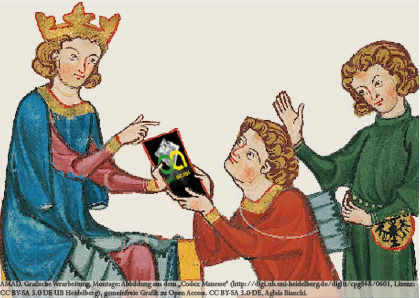AMAD
„Archivum Medii Aevi Digitale - Interdisziplinäres Open-Access-Fachrepositorium und Wissenschaftsblog für Mittelalterforschung‟Zur Einreichung

Langanzeige der Metadaten
| DC Element | Wert | Sprache |
|---|---|---|
| Autor*in | Sylvia Warren | - |
| Autor*in | Nuno R. Faria | - |
| Autor*in | Joachim Wahl | - |
| Autor*in | Oliver G. Pybus | - |
| Autor*in | Mark Pollard | - |
| Autor*in | Adrian L. Smith | - |
| Autor*in | Niels Bleicher | - |
| Autor*in | Renáta Přichystalová | - |
| Autor*in | Rebecca Nicholson | - |
| Autor*in | Cedric K. W. Tan | - |
| Autor*in | Patrik G. Flammer | - |
| Autor*in | Simon Dellicour | - |
| Autor*in | Stephen G. Preston | - |
| Autor*in | Dirk Rieger | - |
| Datum | 2018 | - |
| Quelle | https://doi.org/10.6084/m9.figshare.7115822.v1 | - |
| URI | https://www.amad.org/jspui/handle/123456789/76146 | - |
| Beschreibung | Throughout history, humans have been afflicted by parasitic worms and eggs are readily detected in archaeological deposits. This study integrated parasitological and ancient DNA methods with a large sample set dating between Neolithic and Early Modern periods to explore the utility of molecular archaeoparasitology as a new approach to study the past. Molecular analyses provided unequivocal species-level parasite identification and revealed location-specific epidemiological signatures. Faecal–oral transmitted nematodes ( Ascaris lumbricoides and Trichuris trichiura ) were ubiquitous across time and space. By contrast, high numbers of food-associated cestodes ( Diphyllobothrium latum and Taenia saginata ) were restricted to medieval Lübeck. The presence of these cestodes and changes in their prevalence at approximately 1300CE indicate substantial alterations in diet or parasite availability. Trichuris trichiura ITS-1 sequences grouped into two clades; one ubiquitous and one restricted to medieval Lübeck and Bristol. The high sequence diversity of T.t .ITS-1 detected in Lübeck is consistent with its importance as a Hanseatic trading centre. Collectively, these results introduce molecular archaeoparasitology as an artefact-independent source of historical evidence. | - |
| Sprache | unknown | - |
| Rechte | CC BY 4.0 | - |
| Schlagwörter | archaeology | - |
| Schlagwörter | nematode | - |
| Schlagwörter | trade | - |
| Schlagwörter | diet | - |
| Schlagwörter | cestode | - |
| Schlagwörter | Genetics | - |
| Schlagwörter | Health Care | - |
| Schlagwörter | Diseases | - |
| Schlagwörter | Palaeontology (incl. Palynology) | - |
| Schlagwörter | Epidemiology | - |
| Schlagwörter | ancient DNA | - |
| Schlagwörter | helminths | - |
| Schlagwörter | parasitology | - |
| Dewey-Dezimalklassifikation | 940 | - |
| Titel | Supplementary Information from Molecular archaeoparasitology identifies cultural changes in the Medieval Hanseatic trading centre of Lübeck | - |
| Typ | Paper | - |
| Typ | Text | - |
| AMAD ID | 562238 | - |
| Jahr | 2018 | - |
| Open Access | 1 | - |
| Enthalten in den Sammlungen: | BASE (Bielefeld Academic Search Engine) General history of Europe | |
Dateien zu dieser Ressource:
Es gibt keine Dateien zu dieser Ressource.
Alle Ressourcen in diesem Repository sind urheberrechtlich geschützt, soweit nicht anderweitig angezeigt.

